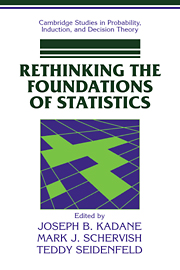Book contents
- Frontmatter
- Contents
- Introduction
- PART 1 DECISION THEORY FOR COOPERATIVE DECISION MAKING
- PART 2 THE TRUTH ABOUT CONSEQUENCES
- PART 3 NON-COOPERATIVE DECISION MAKING, INFERENCE, AND LEARNING WITH SHARED EVIDENCE
- 3.1 Subjective Probability and the Theory of Games
- 3.2 Equilibrium, Common Knowledge, and Optimal Sequential Decisions
- 3.3 A Fair Minimax Theorem for Two-Person (Zero-Sum) Games Involving Finitely Additive Strategies
- 3.4 Randomization in a Bayesian Perspective
- 3.5 Characterization of Externally Bayesian Pooling Operators
- 3.6 An Approach to Consensus and Certainty with Increasing Evidence
- 3.7 Reasoning to a Foregone Conclusion
- 3.8 When Several Bayesians Agree That There Will Be No Reasoning to a Foregone Conclusion
- Index of Names
- Subject Index
3.2 - Equilibrium, Common Knowledge, and Optimal Sequential Decisions
Published online by Cambridge University Press: 05 June 2012
- Frontmatter
- Contents
- Introduction
- PART 1 DECISION THEORY FOR COOPERATIVE DECISION MAKING
- PART 2 THE TRUTH ABOUT CONSEQUENCES
- PART 3 NON-COOPERATIVE DECISION MAKING, INFERENCE, AND LEARNING WITH SHARED EVIDENCE
- 3.1 Subjective Probability and the Theory of Games
- 3.2 Equilibrium, Common Knowledge, and Optimal Sequential Decisions
- 3.3 A Fair Minimax Theorem for Two-Person (Zero-Sum) Games Involving Finitely Additive Strategies
- 3.4 Randomization in a Bayesian Perspective
- 3.5 Characterization of Externally Bayesian Pooling Operators
- 3.6 An Approach to Consensus and Certainty with Increasing Evidence
- 3.7 Reasoning to a Foregone Conclusion
- 3.8 When Several Bayesians Agree That There Will Be No Reasoning to a Foregone Conclusion
- Index of Names
- Subject Index
Summary
INTRODUCTION
In a paper described as an initial exploration of what two Bayesians need to know in order to play a sequential game against each other, DeGroot and Kadane (1983) argue that optimal sequential decisions need not conform to much of what traditional game theory requires of rational play. Specifically:
1. The players' optimal strategies need not form a Nash equilibrium.
2. Nor do the players need to know (or even believe that they know) the optimal choices of their opponent; there is no requirement of “common knowledge,” in that sense.
Nonetheless, these authors propose that
3. Reasoning by backward induction succeeds in locating optimal play.
Each of these three claims is a point of active dispute. For example, regarding (1), in an extended defense of a refined equilibrium concept, Harsanyi and Selten (1988) argue that because of common knowledge
(of mutual rationality) the agents ought to settle on an equilibrium solution – but a refined equilibrium (see also Harsanyi 1989). Aumann (1987), like Harsanyi and Selten, seeks to reconcile Bayesian and game-theoretic rationality but is led to a theory of correlated equilibrium based on an assumption of a “common prior” for different players. Relating to (2), Binmore and Brandeburger (1988), wary of common-knowledge assumptions, seek other grounds for justifying equilibrium solutions. Concerning (3), Bicchieri (1989) questions the validity of backward induction in cases where the agents have too much or too little common knowledge.
- Type
- Chapter
- Information
- Rethinking the Foundations of Statistics , pp. 246 - 266Publisher: Cambridge University PressPrint publication year: 1999

